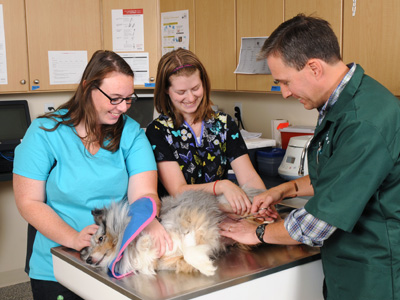Middletown Pet Wellness Services
 The Right Pet Healthcare Makes All the Difference
The Right Pet Healthcare Makes All the Difference
Our Middletown veterinarians and staff at Main Street Veterinary Clinic strongly believe prevention is the key to your pet's long-term health and well being. If a health problem can be detected in its earliest stages, there is a far greater likelihood it can be resolved, or at least managed, with less difficulty, less expense, and greater success.
Your pet's wellness examination at Main Street Veterinary Clinic includes our commitment to:
- Check your pet’s vision and examine the eyes
- Examine their teeth, gums, and oral cavity
- Examine their ears for signs of inflammation and infection
- Auscult their heart and lungs
- Palpate their lymph nodes and abdomen
- Inspect their skin
- Palpate their joints and muscles for signs of arthritis and other orthopedic conditions
- Assess changes in their body weight, appetite, urination and bowel habits
- Discuss preventative techniques
In addition, when indicated we may recommend the following:
- Examine fecal samples for signs of parasitic infection
- Utilize laboratory testing to monitor your pet's blood count and organ function
- Perform basic in-house diagnostic techniques like skin scrapes and skin impression smears
- Perform more advances procedures like x-rays or ultrasound.
During each examination we take the time to listen to your concerns, answer your questions, and give you all the information you need to be the best caregiver to your pet. Good communication is critical to this process and we take the time make sure you understand all your options so you can make intelligent, informed decisions.
 Vaccinations
Vaccinations
Vaccinations are the number one way you can provide immunity to your pet from serious infectious diseases. However, not every pet requires the same series or frequency of vaccinations. At Main Street Veterinary Clinic we tailor our vaccine protocols to your pet based on his or her age, lifestyle, environment, and recommendations from the American Veterinary Medical Association and the American Association of Feline Practitioners.
Adult Dog and Puppy Vaccines
Core Vaccines: Distemper, Bordetella, Rabies
Non-Core: Lyme Disease, Influenza (Flu)
Adult Cat and Kitten Vaccines
Core Vaccines: Feline Distemper, Rabies
Non-Core: Feline Leukemia (for cats that go outside)
Caring for Your New Puppy or Kitten
Bringing a puppy or kitten home is an exciting time for you and your family! In general your puppy’s or kitten’s first year of care at Main Street Veterinary Clinic will include:
- Physical Examinations: Most puppies or kittens between the age of 8-16 weeks are examined several times while they receive their core vaccines and boosters. These longer visits are important because they provide us with more time to assess your pet's overall development while answering questions.
 Vaccinations: Due to their developing immune systems, puppies and kittens must receive a series of properly staged vaccines. Because every pet is unique we tailor our recommendations to your circumstances based on lifestyle, breed, and relevant suggested medical guidelines.
Vaccinations: Due to their developing immune systems, puppies and kittens must receive a series of properly staged vaccines. Because every pet is unique we tailor our recommendations to your circumstances based on lifestyle, breed, and relevant suggested medical guidelines.- Diagnostic Testing: We recommend all new kittens/cats be tested for Feline Leukemia and Feline FIV. This is a simple blood test that takes 10 minutes and is usually run in-house during your first appointment. In addition, we test any new pet for intestinal parasites with a fecal sample, also typically run during the course of the appointment.
- Extended Discussion: Most new pet owners have many questions about nutrition, housetraining, vaccinations, spaying or neutering, parasite protection, exercise, and flea and tick prevention - to name just a few. We take plenty of time to answer these questions; there are many options for most of these issues and we do our best to explain them fully to our clients.
Senior Pet Care
Pets in their senior years - those of about 7 years of age and older - begin to go through a gradual reduction of their capabilities. However, many of the conditions responsible for this deterioration can be amenable to treatment. For example, most dogs develop arthritis in varying degrees over the age of seven; while our senior feline companions are prone to kidney disease. There are many effective treatments for these, and other, common older pet conditions. Early diagnosis is the best way we can offer your beloved pet an extended period of vitality and good health.
Middletown Flea and Tick Prevention
Fleas and ticks are more than a nuisance; they can carry diseases dangerous to you and your pet.
Prevalent tick-borne diseases in Delaware and Maryland include Lyme Disease and Ehrlichiosis; both of which can cause significant illness in dogs.
Fleas are most abundant during the warm weather; however, if left untreated they can be a problem year round. Most animals are at least mildly allergic to flea bites; some sensitive pets can further develop painful reactive skin infections.
We have many safe, effective options for flea and tick control; including topical and newer oral medications. Most of these medications are administered once a month and have significantly greater efficacy than products available in your local pet or grocery store. We can help you navigate the bewildering number of flea and tick products available and choose what works best for you and your pet's needs.
 Heartworm Disease
Heartworm Disease
Heartworm disease is a serious, life-threatening disease transmitted by mosquitoes. It affects dogs and, to a lesser extent, cats. Today, Heartworm disease is found almost everywhere in the continental United States.
Clinical symptoms of Heartworm disease develop very slowly. Early symptoms include lack of energy, exercise intolerance, coughing and difficulty breathing. Because Heartworm disease is increasing in frequency and is a serious and deadly condition, we recommend your dog be tested at 6 months of age and then annually.
Fortunately, Heartworm disease prevention is simple and effective. We stock oral and topical heartworm preventatives. Some of these products also protect against other internal parasites and this can be a confusing topic, especially if your pet already uses a flea and tick preventative. Your veterinarian is your most accessible resource for this kind of question; please call us to find out more information on how to protect your pet from these dangerous parasites.